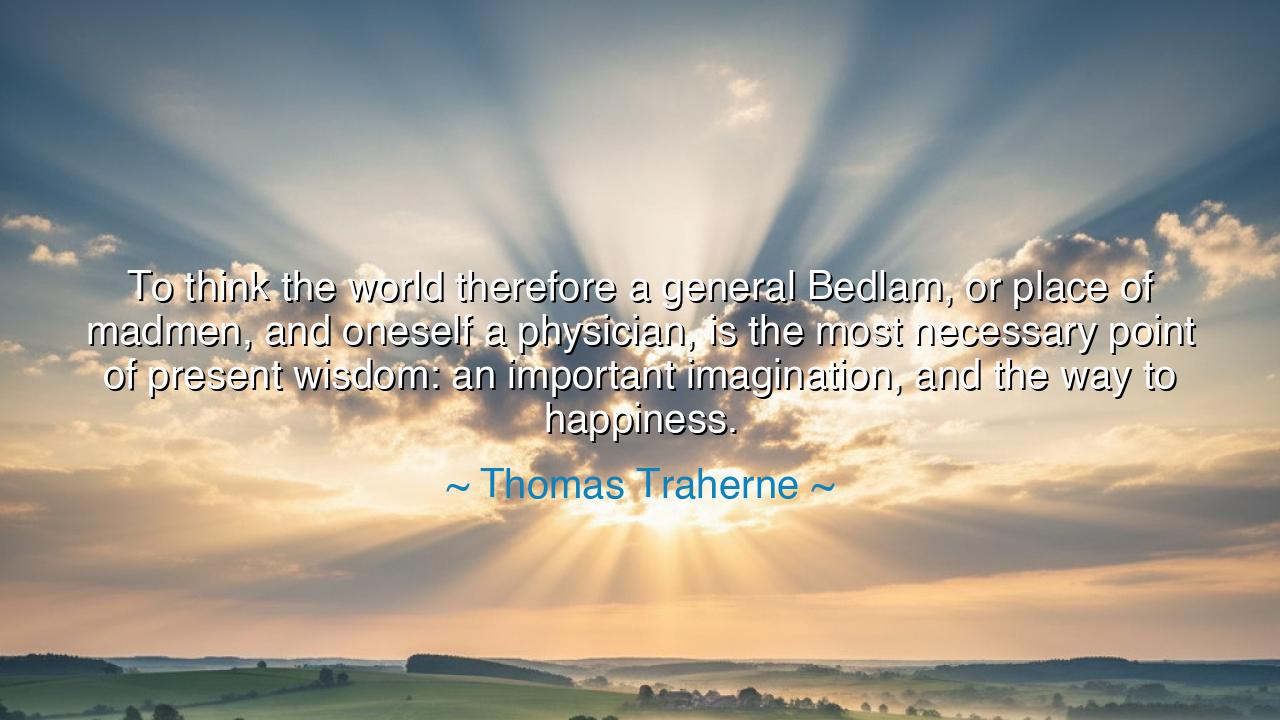
To think the world therefore a general Bedlam, or place of
To think the world therefore a general Bedlam, or place of madmen, and oneself a physician, is the most necessary point of present wisdom: an important imagination, and the way to happiness.






“To think the world therefore a general Bedlam, or place of madmen, and oneself a physician, is the most necessary point of present wisdom: an important imagination, and the way to happiness,” wrote Thomas Traherne, the mystic poet of seventeenth-century England — a man who saw divinity not in temples of stone, but in the open air of existence itself. In these words, he whispers a paradox both solemn and liberating: that to see the world as madness, and oneself as its healer, is not arrogance, but wisdom. For in recognizing the world’s folly, one frees oneself from it; and in imagining the self as a physician of the soul, one finds the courage to live sanely amid chaos.
Traherne’s life was shaped by the aftermath of civil war and the storm of human folly that often follows it. He saw greed disguised as glory, cruelty justified by creed, and ignorance parading as wisdom. To him, the world was indeed a general Bedlam — a great asylum where men raved about wealth and power while starving their spirits. Yet, instead of despising humanity, he sought a higher healing. He believed that imagination — when guided by love and wonder — could become medicine for the soul. Thus, to imagine oneself as a physician among the mad was not delusion, but an act of mercy and survival. It was, as he said, “the way to happiness.”
To call the world a Bedlam is to acknowledge that men chase illusions as if they were eternal truths. They fight for shadows and forget the light. They mistake possession for joy, noise for wisdom, speed for purpose. And yet, Traherne’s counsel is not to condemn, but to understand — to look upon the madness of the world as a healer looks upon the sick: with compassion, patience, and clarity. The physician does not join the patient’s delirium; he stands beside it, offering balance. To imagine oneself as such is to preserve peace of mind while the world shouts and burns.
This wisdom echoes through history. Consider Marcus Aurelius, emperor of Rome and student of the Stoics. Surrounded by wars, betrayals, and the endless vanity of men, he often wrote in his private journals that one must live “as on a mountain,” unmoved by the storm below. He saw the folly of ambition and lust for power, yet did not hate mankind; instead, he sought to govern with reason and calm. Like Traherne’s physician, Marcus saw the world’s madness but refused to be infected by it. Through such imagination — the deliberate vision of sanity amid confusion — he found tranquility.
Traherne speaks, too, of imagination as a sacred instrument of healing. For it is the imagination that allows us to see beyond what is — to envision not only the disease, but the cure. When a man imagines himself as a physician in a world of madness, he awakens the healer within. He learns to treat anger with patience, greed with generosity, despair with gratitude. He ceases to be a victim of chaos and becomes its antidote. This, Traherne calls “the way to happiness” — for happiness, to him, was not the absence of pain, but the triumph of the spirit over the madness of the age.
And yet, the wisdom is not without irony. Traherne calls it “an important imagination,” for he knew that to sustain such a vision requires faith — to act as though one’s small sanity could heal the world’s vast delirium. But imagination, he believed, is divine in nature. It connects the mortal mind to the infinite. By imagining goodness, one creates it; by envisioning harmony, one invites it into being. Thus, even amid madness, the physician of the soul can restore balance through the quiet radiance of his inner vision.
Let this then be the lesson: Do not despair at the madness of the world; let it reveal your purpose. When others rage, remain steady. When others deceive, speak truth. When others curse the dark, light your small lamp and tend it faithfully. See yourself as the physician, not the patient — a healer of hearts, a keeper of sanity, a guardian of peace. Remember that the world has always been a Bedlam of sorts, and that every age has needed its healers.
For the one who walks through chaos with compassion, who refuses to be drawn into folly, who imagines light where others see only shadow — that one has already found happiness, the happiness born not of ignorance, but of wisdom. As Traherne teaches, to imagine the world as mad and oneself as its gentle physician is not madness at all — it is the highest sanity, the triumph of the soul that remembers: even in the asylum of life, one can still heal, create, and love.






AAdministratorAdministrator
Welcome, honored guests. Please leave a comment, we will respond soon